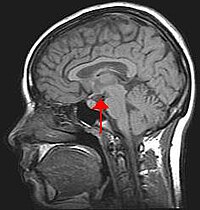
Photo from wikipedia
Gastrin-releasing peptide (GRP) is a neuropeptide that plays roles in various pathophysiological conditions including inflammatory diseases in peripheral tissues; however, little is known about whether GRP can directly regulate endothelial… Click to show full abstract
Gastrin-releasing peptide (GRP) is a neuropeptide that plays roles in various pathophysiological conditions including inflammatory diseases in peripheral tissues; however, little is known about whether GRP can directly regulate endothelial inflammatory processes. In this study, we showed that GRP promotes the adhesion of leukocytes to human umbilical vein endothelial cells (HUVECs) and the aortic endothelium. GRP increased the expression of intercellular adhesion molecule-1 (ICAM-1) and vascular cell adhesion molecule-1 (VCAM-1) by activating nuclear factor-κB (NF-κB) in endothelial cells. In addition, GRP activated extracellular signal-regulated kinase 1/2 (ERK1/2), p38MAPK, and AKT, and the inhibition of these signaling pathways significantly reduced GRP-induced monocyte adhesion to the endothelium. Overall, our results suggested that GRP may cause endothelial dysfunction, which could be of particular relevance in the development of vascular inflammatory disorders.
Journal Title: Biochemical and biophysical research communications
Year Published: 2017
Link to full text (if available)
Share on Social Media: Sign Up to like & get
recommendations!